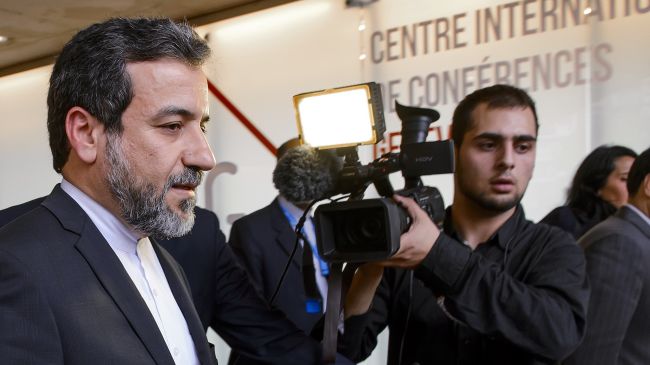Iran, 6 states ‘moving to solve issues’

 An An Iranian deputy foreign minister and a member of Iran’s negotiating team in the nuclear talks with six world powers says the parties to the talks are on course to overcome their divisions.
An An Iranian deputy foreign minister and a member of Iran’s negotiating team in the nuclear talks with six world powers says the parties to the talks are on course to overcome their divisions.
“The differences between the two sides are still numerous; but we are on a path that would have them resolved,” said Abbas Araqchi, Iran’s deputy foreign minister for international and legal affairs, on Wednesday.
Iran and the five permanent members of the UN Security Council – Britain, China, France, Russia and the US – plus Germany wrapped up two days of talks over the Islamic Republic’s nuclear energy program in Geneva, Switzerland, on Wednesday and agreed to meet again on November 7 and 8.
The six countries involved in the talks with Iran have accepted the frameworks of the plan proposed by Iran for solving differences; however, “we should wait for their practical measures in that regard,” Araqchi said.
Responding to a question regarding the format and level of the next round of the talks between the two sides scheduled, the Iranian official stated that Iranian Foreign Minister Mohammad Javad Zarif and EU foreign policy chief Catherine Ashton will attend the next round of the negotiations.
Araqchi once again reiterated that uranium enrichment remains “one of our red lines,” adding, “however, we can discuss its dimensions and level.”
Zarif expressed hope in a press conference after the negotiations that they will herald a “new phase” in the relations between the two sides.
This “will hopefully be the beginning of a new phase in our relations towards closing an unnecessary crisis and opening new horizons,” Zarif said, referring to the title of Iran’s proposal, which was presented during the negotiations on Tuesday.
Earlier, Ashton read out a joint statement by Iran and the six powers issued following the nuclear discussions in Geneva.
She hailed the two-day nuclear talks as the “most detailed” and most “substantive” ones ever held between the two sides, noting that both sides have agreed not to disclose the details of Tehran’s proposal, which she described as an “important contribution.” r and a member of Iran’s negotiating team in the nuclear talks with six world powers says the parties to the talks are on course to overcome their divisions.
“The differences between the two sides are still numerous; but we are on a path that would have them resolved,” said Abbas Araqchi, Iran’s deputy foreign minister for international and legal affairs, on Wednesday.
Iran and the five permanent members of the UN Security Council – Britain, China, France, Russia and the US – plus Germany wrapped up two days of talks over the Islamic Republic’s nuclear energy program in Geneva, Switzerland, on Wednesday and agreed to meet again on November 7 and 8.
The six countries involved in the talks with Iran have accepted the frameworks of the plan proposed by Iran for solving differences; however, “we should wait for their practical measures in that regard,” Araqchi said.
Responding to a question regarding the format and level of the next round of the talks between the two sides scheduled, the Iranian official stated that Iranian Foreign Minister Mohammad Javad Zarif and EU foreign policy chief Catherine Ashton will attend the next round of the negotiations.
Araqchi once again reiterated that uranium enrichment remains “one of our red lines,” adding, “however, we can discuss its dimensions and level.”
Zarif expressed hope in a press conference after the negotiations that they will herald a “new phase” in the relations between the two sides.
This “will hopefully be the beginning of a new phase in our relations towards closing an unnecessary crisis and opening new horizons,” Zarif said, referring to the title of Iran’s proposal, which was presented during the negotiations on Tuesday.
Earlier, Ashton read out a joint statement by Iran and the six powers issued following the nuclear discussions in Geneva.
She hailed the two-day nuclear talks as the “most detailed” and most “substantive” ones ever held between the two sides, noting that both sides have agreed not to disclose the details of Tehran’s proposal, which she described as an “important contribution.”







